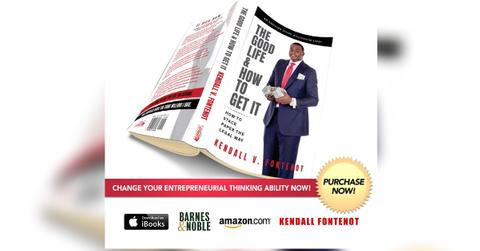 NEWS
NEWSKendall Fontenot Shares The Secret To Scaling Your Venture Like McDonald’s And Burger King

Nov. 13 2022, Published 11:11 p.m. ET
There are worse ways to succeed in business than looking up to big, successful enterprises for cues on how to build a strong enterprise, just as there are worse classes of enterprises to look up to than franchises. After all, data from a U.S. Census Bureau report shows that franchises make up 11.4% of businesses in the industries they looked into. The report found that the same franchises made $9.9 trillion in sales in 2017, with average sales per franchise establishment being $3.5 million, almost 50% more than a non-franchise establishment.
So when Kendall Fontenot looked into the likes of McDonald’s and Burger King to discover secrets to scaling a venture, he knew what he was doing. McDonald’s is the U.S. franchise with the highest global sales, after all, and one of the most recognizable brands in the world. Burger King, though not as prominent internationally, is no slouch, either. So what’s the main takeaway from the success of the biggest franchises according to Kendall Fontenot? “What companies like McDonald’s and Burger King did to scale their business was duplication,” he says.
Kendall Fontenot had this realization at a critical moment in his business career when he was rethinking what he’s done in the past and looking for something to do next. “One moment, I was at the beach drinking lemonade. Next, I realized I want to go back to work, accomplish more, be better than I was the day before,” he says. “So I got home, and I looked for ways to scale what I had going on in that moment to a higher level.”
Kendall is the owner of Ultimate Autoplex and several Checkers and Rally’s franchises, although has interests that branch out into other businesses and fields, too. To grow his business, he went into what he calls duplication mode. Step one, as seen in the success of large franchises, was setting up the processes.
“The companies are a success because they’ve put something together with a proven track record that it works,” Kendall explains. “That's the only reason why one company is stronger and makes more money than the next. It’s not that they opened up in different places. They change what they have to keep what they have, but they just figure out what works and then multiply it.”
Want OK! each day? Sign up here!
Setting up good processes can help with one of the more serious challenges of scaling a business this way, and that’s the need for the owner to always be around. This is something that was weighing down on Kendall Fontenot because he’s seen what happens when the owner can’t be around to take care of the company. After a friend of his died in a car accident, Kendall saw his $50 million company close within months because no one was able to run it except the man who set it up.
That’s how Kendall got the idea of opening a franchise. “I wanted to get into a business that already has systems and processes in place that would outlive me, and franchises have already set up a proven track record, been around for years,” he says. “But I realized that all these companies like Starbucks and McDonald’s want owner-operators, and I didn’t have time to do that because I have another business that I’m building that I'm more passionate about.”
What Kendall Fontenot decided was to look for a franchise that had a different model, and that’s what he found in Checkers and Rally’s. Everything about it screamed scalability and growth potential to Kendall, from the fact that it uses modular objects and focuses on drive-through service, to the ability to have an operator and a manager take care of the location and relieve him of all the micromanagement other franchises require. So he started opening Checkers and Rally’s locations.
The duplication process he likes so much isn’t without flaws, though. Kendall knows he cannot duplicate himself – and thankfully he doesn’t need to – but the human element can still pose a problem when scaling any type of business. “The hardest part of duplication is finding the people you can trust. In growing a company, someone else has to be in charge, you have to delegate authority to somebody to have it in your stead,” he explains.
Kendall Fontenot saw his fair share of troubled employees, from people who started stealing to people who wanted to do things their way. “You have to let them know, look, if you go to work at McDonald’s, you can't come in and cook the same hamburger you could get at your house. You have to follow the recipe for the Big Mac,” he says. “So just finding trustworthy people that wanted to follow the process, believe in the process, and were loyal to the company, can be challenging. But it’s also rewarding when you get it right, too.”

